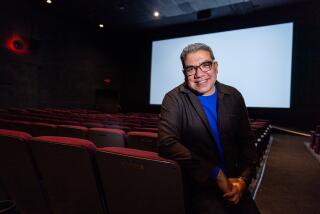‘I set out to change the system, and I did.’
- Share via
It has been more than a decade since Robert Sundance, after years of living as an alcoholic on Skid Row, began his singular battle against the way the police and courts handle public drunks.
The tall Sioux Indian, during more than 300 arrests for public drunkenness and in spite of an eighth-grade education, handwrote countless court petitions, calling for an end of what he called the “barbarous treatment” of alcoholics like himself.
Eventually he came to the attention of public interest lawyers and their lawsuit on his behalf resulted in a milestone Superior Court ruling in 1978. From then on in Los Angeles, police could no longer automatically take public inebriates to jail. They had to provide the opportunity to go to a detoxification program, and transport Skid Row inebriates in humane, padded, uncrowded vehicles rather than the old “paddy wagons.”
“I set out to change the system, and I did,” Sundance said recently with pride. Now 61, he is director of the Indian Alcoholism Commission, a post he has held for nine years. It is a one-man, county-funded program that works to promote public awareness of Indian alcohol problems.
He has traded his pen for an electric typewriter now, and aims his ever florid and colorful vocabulary at what he calls the “pestiferous booze merchants, who promote their disease-causing product.” Tanned and blue-eyed, with white hair in a long ponytail down his back, Sundance pecks out his messages in a one-room office in downtown Los Angeles, and sends them off to state legislators, congressmen, local officials and newspaper editors.
He is frustrated, he said, by society’s failure to deal with the source of alcoholism, which he considers those who produce and sell liquor. “True prevention,” he said, “means controlling the advertising, which glamorizes alcohol, and controlling the liquor outlets.”
He participates in workshops about alcoholism, makes presentations, and tries to help individual Indian alcoholics. He became sober himself, he said, while the first Sundance case was being litigated.
In late 1986, the California Supreme Court turned down another Sundance bid to have arrests of public drunks declared unconstitutional, on the grounds that they are ill and not criminals. The U.S. Supreme Court later refused his petition to consider the issue.
Sundance lives now on a smaller stage than 10 years ago, when the case brought him so much publicity, and sometimes he frets that the world has forgotten him. Last year however, an autobiographical account of his years as an alcoholic was included in a book called “Recoveries.” In it, he said he started drinking on a Sioux reservation at age 3.
Sundance lives frugally, renting a room at the downtown Rosslyn Hotel, driving a battered Pinto, and doing his office chores himself.
He works six days a week, he said, but finds the job of battling alcoholism “depressing and disillusioning, because the problem’s getting worse.” When an alcoholic agrees to go into a program, “there aren’t enough programs,” he explained, adding that if they do get in, “there’s a horrendous lack of housing” when they emerge. “They have no place to go.”
Skid Row has changed, he said, with an influx of Central-American immigrants and unemployed people from elsewhere in the country. Still, he maintained, “At least half the people on Skid Row have drinking problems. Alcohol is still king.”
More to Read
Only good movies
Get the Indie Focus newsletter, Mark Olsen's weekly guide to the world of cinema.
You may occasionally receive promotional content from the Los Angeles Times.










